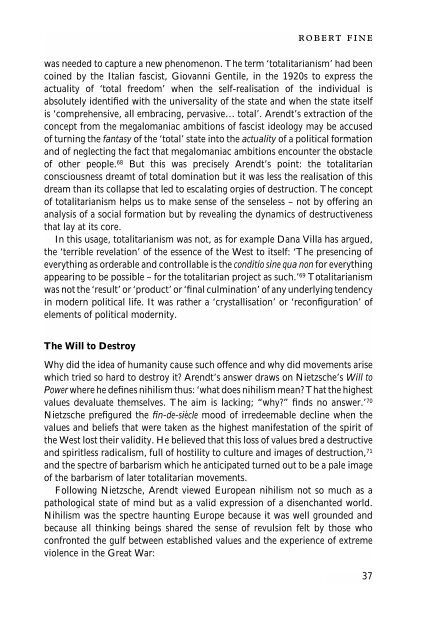Create successful ePaper yourself
Turn your PDF publications into a flip-book with our unique Google optimized e-Paper software.
was needed to capture a new phenomenon. The term ‘totalitarianism’ had been<br />
coined by <strong>the</strong> Italian fascist, Giovanni Gentile, in <strong>the</strong> 1920s to express <strong>the</strong><br />
actuality of ‘total freedom’ when <strong>the</strong> self-realisation of <strong>the</strong> individual is<br />
absolutely identified with <strong>the</strong> universality of <strong>the</strong> state and when <strong>the</strong> state itself<br />
is ‘comprehensive, all embracing, pervasive… total’. Arendt’s extraction of <strong>the</strong><br />
concept from <strong>the</strong> megalomaniac ambitions of fascist ideology may be accused<br />
of turning <strong>the</strong> fantasy of <strong>the</strong> ‘total’ state into <strong>the</strong> actuality of a political formation<br />
and of neglecting <strong>the</strong> fact that megalomaniac ambitions encounter <strong>the</strong> obstacle<br />
of o<strong>the</strong>r people. 68 But this was precisely Arendt’s point: <strong>the</strong> totalitarian<br />
consciousness dreamt of total domination but it was less <strong>the</strong> realisation of this<br />
dream than its collapse that led to escalating orgies of destruction. The concept<br />
of totalitarianism helps us to make sense of <strong>the</strong> senseless – not by offering an<br />
analysis of a social formation but by revealing <strong>the</strong> dynamics of destructiveness<br />
that lay at its core.<br />
In this usage, totalitarianism was not, as for example Dana Villa has argued,<br />
<strong>the</strong> ‘terrible revelation’ of <strong>the</strong> essence of <strong>the</strong> West to itself: ‘The presencing of<br />
everything as orderable and controllable is <strong>the</strong> conditio sine qua non for everything<br />
appearing to be possible – for <strong>the</strong> totalitarian project as such.’ 69 Totalitarianism<br />
was not <strong>the</strong> ‘result’ or ‘product’ or ‘final culmination’ of any underlying tendency<br />
in modern political life. It was ra<strong>the</strong>r a ‘crystallisation’ or ‘reconfiguration’ of<br />
elements of political modernity.<br />
The Will to Destroy<br />
robert fine<br />
Why did <strong>the</strong> idea of humanity cause such offence and why did movements arise<br />
which tried so hard to destroy it? Arendt’s answer draws on Nietzsche’s Will to<br />
Power where he defines nihilism thus: ‘what does nihilism mean? That <strong>the</strong> highest<br />
values devaluate <strong>the</strong>mselves. The aim is lacking; “why?” finds no answer.’ 70<br />
Nietzsche prefigured <strong>the</strong> fin-de-siècle mood of irredeemable decline when <strong>the</strong><br />
values and beliefs that were taken as <strong>the</strong> highest manifestation of <strong>the</strong> spirit of<br />
<strong>the</strong> West lost <strong>the</strong>ir validity. He believed that this loss of values bred a destructive<br />
and spiritless radicalism, full of hostility to culture and images of destruction, 71<br />
and <strong>the</strong> spectre of barbarism which he anticipated turned out to be a pale image<br />
of <strong>the</strong> barbarism of later totalitarian movements.<br />
Following Nietzsche, Arendt viewed European nihilism not so much as a<br />
pathological state of mind but as a valid expression of a disenchanted world.<br />
Nihilism was <strong>the</strong> spectre haunting Europe because it was well grounded and<br />
because all thinking beings shared <strong>the</strong> sense of revulsion felt by those who<br />
confronted <strong>the</strong> gulf between established values and <strong>the</strong> experience of extreme<br />
violence in <strong>the</strong> Great War:<br />
37

















